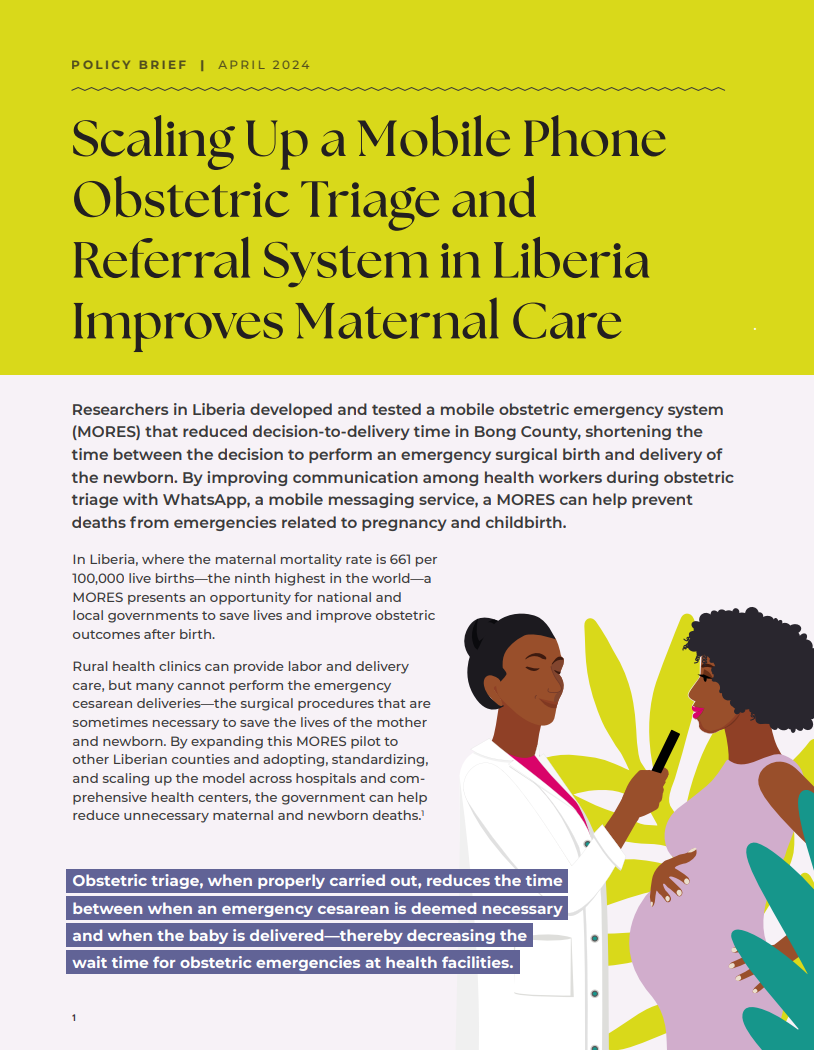Research Technical Assistance Center
Date
December 30, 2024
English Publication
Researchers from the University of Liberia College of Health Sciences, in partnership with the University of Michigan School of Nursing and the Kwame Nkrumah University of Science and Technology, developed and tested a mobile obstetric emergency system (MORES) that reduced decision-to-delivery time in Bong County, Liberia, shortening the time between the decision to perform an emergency surgical birth and delivery of the newborn. By improving communication among health workers during obstetric triage with WhatsApp, a mobile messaging service, a MORES can help prevent deaths from emergencies related to pregnancy and childbirth.
This brief provides additional information on cesareans and triage and how better communication can be lifesaving for mothers and newborns. In addition to sharing details of the research and an example of closed-loop communication system at work, the brief provides two recommendations for the Liberian Ministry of Health to reduce decision-to-delivery times and improve perinatal outcomes, thereby saving lives.

Liberia Takes Its First Census in 24 Years
Census takers visited dwellings throughout Liberia in late March to take the first census in Liberia since 1984. Billboards were erected to remind villagers to stay home for three days to be properly counted. To get the word out, the government commissioned a pop star to compose a catchy tune about the census. Translated into 16 languages and played daily on the radio, it urged Liberians to “stand up and be counted.”1
Until last month, Liberia was one of 13 countries, mostly in Africa, that had not conducted a census since 1990 or earlier (see table).
Countries That Have Not Taken a Population Census Since 1990 or Earlier
| Year of Last Census | Census Taken or Planned | |
|---|---|---|
| Burundi | 1990 | August 2008 |
| Uzbekistan | 1989 | * |
| Somalia | 1987 | * |
| Dem. Rep. of Congo | 1984 | 2010 |
| Eritrea | 1984 | 2009 |
| Myanmar | 1983 | * |
| Togo | 1981 | 2009 |
| Afghanistan | 1979 | August 2008 |
| Angola | 1970 | 2010 or 2014 |
| Lebanon | 1970 | * |
| Western Sahara | 1970 | * |
| Djibouti | 1960 | * |
*It is expected that a census will be held during the decade (2005-2014).
Sources: United Nations, Population and Vital Statistics Report (2007); and UN Statistics Division, 2010 World Population and Housing Census Programme: Census Dates for All Countries (http://unstats.un.org).
What’s Behind the Delay?
“Limited budgets, lack of trained personnel, and unstable political situations can pose obstacles,” says Carl Haub, the Conrad Taeuber Chair of Public Information at the Population Reference Bureau. In Liberia’s case, a 14-year civil war between 1989 and 2003 intervened.
Countries often do not have the technical staff to process the data collected.2 Sometimes a fear of controversial results prevents governments from holding a census. Leaders may fear internal unrest if the census reveals shifts in the relative size of certain religious or ethnic groups that are not reflected in the power structure or distribution of economic resources.
The census form in Liberia asks about the number of household members, religion, tribal group, occupation, and recent deaths in the family. Answers to questions about household assets such as radios, televisions, and motorbikes will be used to estimate income.3
A New Experience for Many
Peter Way, chief of the International Programs Center in the U.S. Census Bureau’s Population Division, recently returned from a trip to assist with Liberia’s census. Apparently, some Liberians thought that everyone would be enumerated the first day of the census. So they were a bit dejected after waiting at home all day only to have no one show up. “It’s been 24 years since their last census,” explains Way. “So people don’t have much experience with census-taking.”
In a country where nearly half the population is estimated to be younger than 15, many have never lived through a census.4
The numeration was scheduled to last about a week. Way noted that the census takers had good enumeration area maps and a fully electronic GIS system at their disposal. “They seemed to be reasonably well-organized,” said Way, “and seemed to be going about it enthusiastically.”
One census employee from Way’s department is still in Liberia, assisting with data entry, processing, and editing. They hope to do more work in the coming months to help analyze and disseminate the results. If all goes according to plan, preliminary census results will be made available by this May and final census numbers will be available in April 2009.
Sandra Yin is editor at the Population Reference Bureau.
References
- Nico Colombant, “Liberia Tries to Count Citizens,” Voice of America, accessed online at www.voanews.com, on March 27, 2008; and Rukmini Callimachi, “Liberia Census Highlights Distrust of Government,” Associated Press, accessed online at www2.nysun.com, on March 27, 2008.
- However, countries in developing regions often count on financial or technical assistance from the UN Population Fund, the UN Statistics Division, the U.S. Agency for International Development, and the U.S. Census Bureau. Since World War II, for example, the U.S. Census Bureau has trained more than 15,000 people abroad on how to work with census taking and analysis.
- Nico Colombant, “Liberian Census Plods Ahead,” Voice of America, accessed online at www.voanews.com, on March 31, 2008.
- Carl Haub, 2007 World Population Data Sheet (Washington, DC: Population Reference Bureau, 2007).


